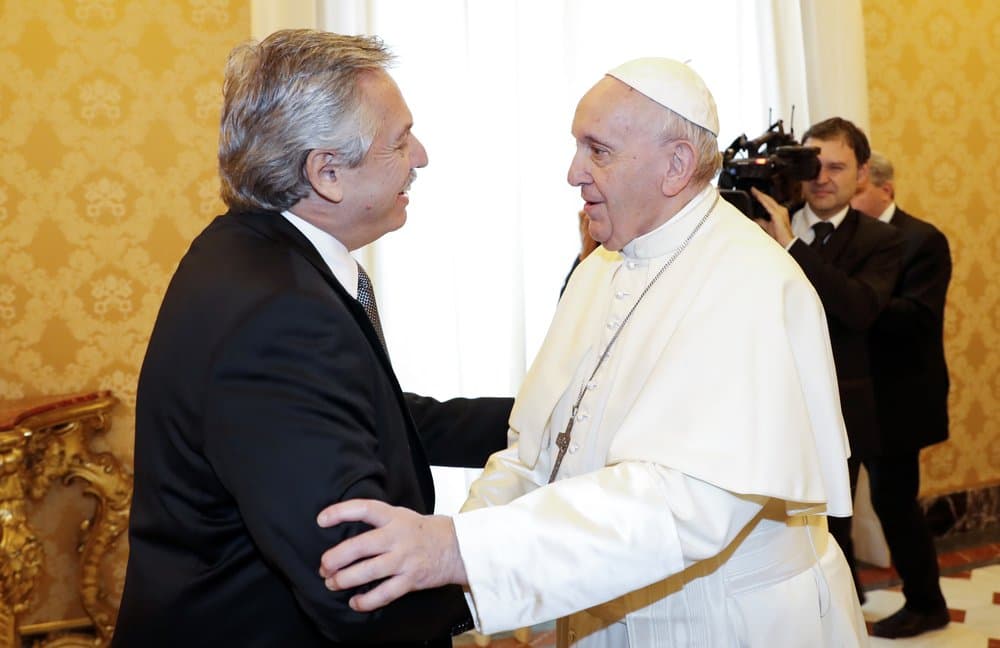ROSARIO, Argentina – Closing the XXIII annual meeting of Argentina’s Christian Association of Business Executives (ACDE), the country’s president called for the recovery of the “best capitalism” exemplified by the ACDE’s founder Enrique Shaw, who is being considered for sainthood.
“We have to go towards a more noble capitalism,” said President Alberto Fernandez during an online talk followed by over 2,000 businesspeople from Argentina and other parts of the world.
The Argentine president said that after the coronavirus pandemic, the world has a unique opportunity to be better, adding this can be achieved by reviewing capitalism, which before the global health crisis, “it was degrading, and it’s time to put it in its true dimension.”
The president did not challenge capitalism as the best possible economic model but said it must be conducted in a better way.
The annual meeting of ACDE took place on Tuesday and was completely online, due to the COVID-19 pandemic. The motto of this year’s gathering was “Undertake: Co-create to rebuild.”
Enrique Shaw was born in 1921 into a wealthy family. He joined the Navy at a young age and eventually took several positions of leadership in his family’s companies, with the intention of promoting, and putting into practice, the Catholic Church’s social teaching.
He died from cancer in 1961.
In an interview with a Mexican TV station in 2015, Pope Francis said he’s moving forward with Shaw’s cause for beatification despite defining him as “a rich man.”
“Enrique Shaw was rich, yet saintly,” Francis told Televisa. “A person can have money. God gives it to him so he can administer it well, and this man administered it well. [He did so] not with paternalism, but by fostering the growth of people who needed help.”
It’s telling that, back when he was still the archbishop of Buenos Aires, the future pope asked his eventual hand-picked successor, Archbishop Mario Poli, to conduct the theological research into the cause.
Shaw had 3,000 employees at a firm called Rigolleau Glassware, and established a pension fund and a health care system to provide his workers with medical services, financial support in case of illness, and loans for important life events such as marriages, births, and funerals. He was also famously friendly to his competitors, since he saw them not as a threat, but as a source of employment for those he couldn’t hire.
Fernandez called Shaw an example of the “best of capitalism, where businessmen like Enrique Shaw invested and gave work for the development of our societies.”
The president also emphasized that “when the financial manager became more important than the production manager, the worst capitalism surfaced. These are the debates that we’ll need to face.”
For Fernández, “Argentina must industrialize to the maximum, because industry is the great generator of work. The agricultural and livestock sector is very important for Argentina in a world that needs food. It is time to put value on that food and stop the export of grains to fatten animals. ”
“I am not the only one who is proposing these things, leaders such as [French President Emmanuel] Macron and [German Chancellor Angela] Merkel supported me at the G-20 meeting,” Fernández added.
He concluded saying: “I don’t think there’s an option for capitalism, but I do believe that it was degrading and it’s time to put it in its true dimension.”
Pope Francis too has had a critical view of capitalism.
For instance, in May 2019 he called this economic model “profit-oriented, shortsighted, and based on the misconception of unlimited economic growth,” and said that it results in a “disastrous impact on the natural world.”
“Economic powers continue to justify the current global system where priority tends to be given to […] the pursuit of financial gain, which fail to take the context into account, let alone the effects on human dignity and the natural environment,” he said.
Earlier this year, meeting the members of the Council for Inclusive Capitalism, the pope called for the promotion of a more just and humane economy that contributes to the eradication of poverty on the global level, arguing that economics without ethics leads to a “throw-away” culture.
Tuesday’s virtual meeting opened with a prayer by Bishop Jorge Ruben Lugones, head of the Argentine bishops’ conference Commission for Social Ministry.
“We are facing a very difficult time, but also an opportunity to recognize ourselves as stewards to build an equitable and fraternal society,” Lugones said. “From the Church we want to encourage businessmen to make gestures of fraternal solidarity with a more visible evangelical sense.”
The meeting was led by Silvia Sioli de Torres Carbonell, director of the School of Administration and Business at the IAE Business School, who said that society “cries out” to business, political, social and religious leaders to “find new solutions to return to live in a country of which we are proud.”
She also referred to the debt that constitutes “poverty and lack of decent employment” and the role of companies and entrepreneurs in society.
“Entrepreneurship is, ultimately, the biblical and spiritual meaning of co-creation, in that the human being finds her reason for being in the act of continuing the Creator’s action,” she said.
ACDE believes that “it’s not through extreme positions or permanent confrontation that we will find a way out of this crisis, but through dialogue: a sincere, profound dialogue, based on truth and genuine vocation for the common good,” Sioli said.











